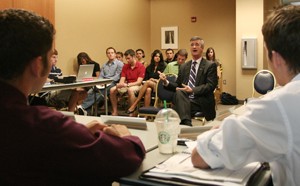At the Associated Students of the University of Arizona meeting on Wednesday evening, President Robert Shelton addressed the budget-related issues that will affect students the most. He spent a small portion of his address referencing actual numbers and the majority of the time looking at how the budget cuts will affect students, faculty and teachers.
He also emphasized the UA’s goals compared to other universities, primarily Arizona State University.
Shelton said that the UA has looked at a number of universities who have recently moved to an activities-centered management model, where tuition dollars flow to the units the students are registered under, which is currently implemented in UA’s summer session. Shelton said the departments that receive more funding are those that are the most unique and successful at the UA.
“”We have to be very careful as we go into this not to damage the activities and disciplines that put this university on the map. We cannot close programs that are unique to the university. The transformation process is designed to minimize the impact of the budget situation on the students. We have to decide which departments to maintain and build quality, and which areas we can let it slip.”” Shelton said.
In regards to staff cuts, Shelton said the hiring freeze is already in effect, but there are a few exceptions. Contracts that have already been offered to employees are allowed to appeal the freeze. Unfortunately, staff and administrative personnel are most vulnerable to budget and salary cuts.
Unlike the UA, ASU already has plans to cut 200 or more faculty associates, who teach on a semester-by-semester basis.
“”From what I understand, if Arizona State declares financial emergency, then all staff and faculty contracts could be invalidated. We will not do that. I will refuse to do that,”” Shelton said.
Shelton foreshadowed an almost certain tuition increase for undergraduate students. He explained that instead of critiquing or making suggestions about tuition, the Board of Regents revised its policies and is now putting a boundary for public university tuition by using a selection of universities in the region.
“”The regents have put a boundary condition that says we cannot go below the bottom or top of a third of our peer group. We are way down (in tuition cost), but that does not mean we are protected because we are, so far, below the average. This gives us a tuition leeway maximum increase of about $600 to $650. We are giving it serious consideration because it gives us a better balance of funding. We think it is more effective to have students pay more and, therefore, have less of a hit on course availability and other accommodations to students,”” Shelton said.
During the question and answer portion of the meeting, ASUA senator and education junior, Bryan Baker gave his perspective on the situation in order to personalize the ordeal.
“”I came here to get the best education. I would err on the side of more people in a class versus fewer classes, because it is so hard to get classes right now. I wasn’t able to get into the classes I wanted to get, even though I was in high priority registration. I would rather pay the extra $600 more if I could get into the classes I wanted and interest me,”” Baker said.
Shelton said he would like student participation and feedback in this process. He wants to know what classes and departments students feel are the strongest and what students believe are the most important places to filter funding.
“”If you take a 5 percent cut in the state budget, no matter what section it is in, something has to give: Either we offer fewer class or you offer classes that are larger, or maybe your class meets twice a week instead of three times a week and you earn the same amount of credits,”” Shelton said.
Overall, he stressed that the UA, regardless of budget cuts, will stay a world-class university.
“”In the long run, what matters is the institution that you graduate from continues to be viewed as a stellar institution, so that the quality of your diploma continues to appreciate, not depreciate. That is the long-term goal that cannot be monopolized. We need to focus on how to maintain our status with all of these dips in funding,”” Shelton said.









